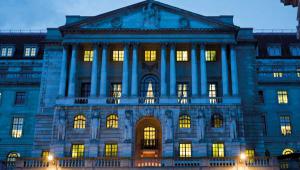The chancellor talked up the health of the public finances in his autumn statement, but played down the OBR's gloomier predictions on long-term fiscal sustainability
Today George Osborne announced extra funding for the NHS funded by fines on banks, and additional spending on infrastructure financed by freezing public sector pay through the next parliament. The deficit loomed over every announcement he made and there were few giveaways, making the ones he did announce all the more notable. He reeled off a long list of small announcements but the overall message of this Autumn Statement was that the coalition will press ahead with austerity and keep a tight rein on spending.
The chancellor was keen to point to the Office for Budget Responsibility's forecasts that support his fiscal ambitions. Growth forecasts have been revised down by 0.4 per cent over the next five years due to the slowing of the global economy. That will put further pressure on the disappointingly low tax revenues. However, the deficit is forecast to fall more rapidly than was expected at the time of the Budget. Indeed, the latest forecasts, released alongside the Autumn Statement, predict that the structural deficit will be eliminated in 2017-18, a year earlier than previously expected. That is partly due to the chancellor's policy announcements and partly due to fortune: interest payments on the national debt have been less than expected.
What the chancellor failed to mention are the Office for Budget Responsibility's long-term projections of fiscal sustainability, beyond the next five years. They show the enormous demographic challenges the country faces over the next fifty years. The cost of state pensions, even accounting for the rise in the pension age, will increase by a third to 8 per cent of GDP. That will happen against a backdrop of falling employment as more people enter retirement and fewer people remain in the workforce to support them.
But even the potential cost of the state pension is dwarfed by the cost of providing healthcare to an ageing population. The chancellor highlighted his concern with the national debt today, which is forecast to peak at 81 per cent of GDP. At the current rate of growth, the rising NHS expenditure will cause debt to exceed 200 per cent of GDP over the next fifty years. Yet, at a Reform conference on health policy the day before the Autumn Statement, both Andy Burnham and Jeremy Hunt agreed that what the NHS needs is not more money but radical transformation. Achieving the reorganisation that is essential for long-term fiscal sustainability will require political willpower from those holding the purse strings.
Addressing these long-term challenges requires an eye to the future that was not evident in today's Autumn Statement. The chancellor announced additional funding for the NHS, even as other departmental budgets continue to be cut. The 'triple-lock' on the state pension guarantees that its generosity will increase more rapidly than either wages or the cost of living. These omissions indicate the government's reluctance to tackle the long-term problems.
James Zuccollo is a senior economist at the independent think-tank, Reform










